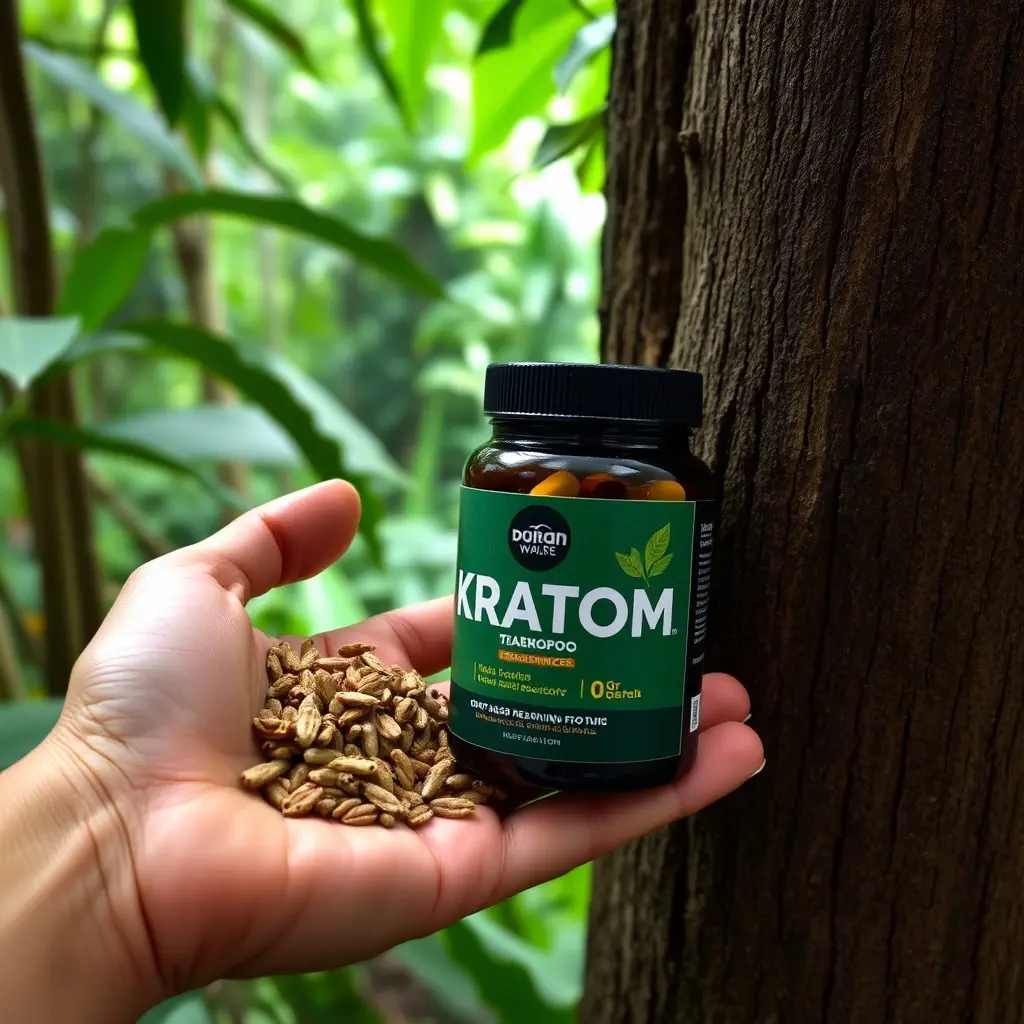Kratom, derived from Southeast Asian Mitragyna speciosa plants, contains alkaloids like mitragynine and 7-hydroxymitragynine that may offer anti-inflammatory effects by interacting with opioid receptors and regulating the immune system to reduce inflammation. Studies suggest these compounds can modulate cytokine production, potentially alleviating chronic inflammation linked to various health issues. While there is potential for kratom supplements to provide benefits, it's essential to consult healthcare professionals due to varying efficacy and safety profiles. The combination of kratom with cinnamon, which is widely available online, may enhance its anti-inflammatory properties. This synergy targets inflammation at a pathway level by leveraging both substances' shared immune response modulating effects. However, the exact nature of this interaction needs further investigation, and users should seek guidance from qualified health practitioners when combining these supplements. The legal status of kratom varies, so it's important to ensure its legality in your area. Due to potential interactions with other medications, caution is advised, and professional medical advice is recommended before incorporating kratom into any health regimen. For those interested in exploring the benefits of kratom, consider cinnamon-enhanced products available online, which may offer a more potent anti-inflammatory effect when used together. Always consult with a healthcare provider to make informed decisions about your wellness routine.
Kratom supplements have emerged as a potential natural solution for those seeking to mitigate inflammation, offering a promising alternative to conventional treatments. This article delves into the anti-inflammatory properties of kratom, exploring how it interacts with the body’s inflammatory responses and its synergistic effects when combined with cinnamon online. We will examine the scientific evidence supporting its use, highlighting the key alkaloids responsible for kratom’s anti-inflammatory benefits. Join us as we uncover the role of kratom supplements in inflammation reduction and consider the potential applications and precautions for this intriguing natural remedy.
- Unraveling the Role of Kratom Supplements in Inflammation Reduction
- The Synergistic Effect of Kratom and Cinnamon Online in Combating Systemic Inflammation
- A Closer Look at Kratom's Anti-Inflammatory Alkaloids: Potential Benefits and Considerations
Unraveling the Role of Kratom Supplements in Inflammation Reduction

Kratom, a plant from Southeast Asia with leaves that contain compounds which can interact with the body’s opioid receptors, has garnered attention for its potential anti-inflammatory properties. Research indicates that kratom alkaloids, such as mitragynine and 7-hydroxymitragynine, may play a role in modulating the immune response and reducing inflammation. This suggests that kratom supplements could be beneficial for individuals experiencing chronic inflammation, which is often associated with various health conditions. The anti-inflammatory effects are believed to be due to the alkaloids’ ability to influence cytokine production, which are key signaling molecules in the immune system.
Moreover, the integration of kratom supplements should be approached with caution, as their efficacy and safety profiles can vary. Users considering incorporating kratom into their wellness routine are advised to consult with healthcare professionals first. In this context, it’s relevant to note the potential synergistic effects when kratom is used in conjunction with other natural compounds like cinnamon. Cinnamon, a popular spice available online and in stores, has been studied for its own anti-inflammatory and antioxidant properties. The combination of kratom with cinnamon may offer enhanced anti-inflammatory benefits, although further research is necessary to fully understand this interaction. Users interested in experimenting with such a combination should seek guidance from qualified health practitioners to ensure the safest and most effective use of these supplements.
The Synergistic Effect of Kratom and Cinnamon Online in Combating Systemic Inflammation

Studies have increasingly shown that kratom, a plant-based supplement derived from the leaves of Mitragyna speciosa, exhibits potential anti-inflammatory properties. Its efficacy in this realm may be enhanced when combined with cinnamon, a spice well-represented online and recognized for its own anti-inflammatory and antioxidant effects. The synergy between kratom and cinnamon online emerges from their shared ability to modulate the body’s immune response, particularly in reducing systemic inflammation. Kratom’s alkaloids, such as 7-hydroxymitragynine and mitragynine, have been found to influence various pathways that regulate inflammation, while cinnamon’s active components, including trans-cinnamaldehyde, contribute to its anti-inflammatory action. This combination is particularly promising as it targets the underlying mechanisms of inflammation without necessarily suppressing the immune system entirely. Users interested in exploring this synergy can easily source high-quality cinnamon online, ensuring they have access to a potent natural supplement to complement their kratom regimen for managing inflammatory conditions. The integration of these two compounds in a health regimen may offer a more holistic approach to inflammation reduction, especially when conventional treatments are less desirable or effective. As with any supplement regimen, it is advisable to consult healthcare professionals before incorporating kratom and cinnamon into one’s wellness plan to ensure safety and appropriateness for individual health needs.
A Closer Look at Kratom's Anti-Inflammatory Alkaloids: Potential Benefits and Considerations

Kratom, a tropical tree native to Southeast Asia, has been traditionally used for its medicinal properties. Among its diverse alkaloids, mitragynine and 7-hydroxymitragynine stand out due to their potential anti-inflammatory effects. These compounds interact with the body’s opioid receptors, which may help in reducing inflammation, a common source of discomfort and pain. Research suggests that kratom’s alkaloids could modulate immune responses and inhibit pro-inflammatory cytokines, offering hope for those seeking natural alternatives to manage inflammatory conditions.
When considering the use of kratom supplements for inflammation reduction, it is crucial to approach this topic with a cautious perspective. While the anti-inflammatory potential is promising, the safety and efficacy of kratom are still under scrutiny by regulatory bodies and researchers alike. Users interested in exploring kratom should be aware of the legal status of the supplement in their region, as it varies widely across countries and states. Additionally, the interaction between kratom and any medications one may be taking is a significant concern, highlighting the need for informed decision-making under the guidance of a healthcare professional. For those intrigued by the anti-inflammatory properties of kratom and seeking a natural approach, it is advisable to procure high-quality kratom products, such as those offering cinnamon-enhanced kratom capsules, which may further contribute to inflammation reduction due to cinnamon’s own anti-inflammatory properties. As with any supplement, it is imperative to consult with a healthcare provider before incorporating kratom into one’s wellness regimen.
In conclusion, the evidence suggests that kratom supplements may offer a promising avenue for inflammation reduction. The synergistic potential of combining kratom with cinnamon, as explored in ‘The Synergistic Effect of Knatom and Cinnamon Online in Combating Systemic Inflammation,’ highlights a novel approach to managing inflammatory conditions. A deeper dive into the anti-inflammatory alkaloids found within kratom leaves sheds light on their therapeutic properties, offering insight into how these compounds might benefit individuals experiencing chronic inflammation. While further research is necessary to fully understand the extent of its effects and optimal dosing, the current findings warrant consideration for those exploring natural remedies for inflammation. Cinnamon online sources could play a significant role in this regard, providing access to both supplements and credible information on their use.






